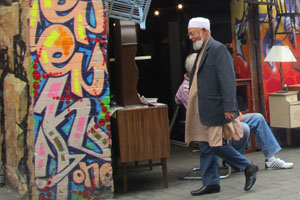
Research into ethnic minorities and their neighbours.
People from minorities are more likely to feel part of Britain when their neighbours are from different ethnic backgrounds, according to research from the University.
Published in the journal Sociology, the research is the most comprehensive study of community cohesion yet carried out, and involved Dr Neli Demireva from Essex, and Professor Anthony Heath, of the University of Oxford, analysing data from two surveys on 4,391 British people, 3,582 of them from ethnic minorities.
They found that when minorities lived in highly diverse areas, where there were few people from their own ethnicity, this did not lessen their trust in neighbours, their willingness to help neighbours, or how often they took part in civic action such as joining local groups.
Minorities living in these areas were also about 5% more likely to identify with Britain as a whole than those who lived among people mainly from their own background.
“Diversity does not appear to have a significant nega¬tive effective on civicness among minorities,” say the researchers. “Diversity plays a positive role in the formation of feelings that transcend the respondent’s own ethnicity.”
The researchers suggest that “if anything, diversity should be encouraged to cement the integration progress of migrants.”
The authors say that previous studies in the US and Europe had been more negative about the effects of ethnic mixing on trust and civic spirit. But their research showed that “diversity is clearly here to stay and our findings on the positive effects of inter-group contact suggest that we should not be pessimistic about the implications.”
By contrast, white Britons living in high diversity areas, with many people from different ethnic backgrounds, were 5% less likely to trust others than white people living in low diversity areas. This was closely linked to how poor an area was and how fearful of crime were white Britons, the research showed – if these factors weren’t in play, there was no fall in trust.
The researchers point out that this was a small effect when compared to the level of education of respondents: overall, white Britons with degrees were 27% more likely to trust others than white Britons with no education, for instance.
The researchers also found that white Britons living in areas of high diversity were 15% less likely to identify with their own ethnic group, despite the decline in trust.
“There is some negative but modest impact of increasing diversity among white British,” the researchers say in their article, entitled ‘Diversity and the Civic Spirit in British Neighbourhoods’.
The researchers say their work takes more indicators of cohesion into account than previous research. “In this study we examine a wider range of measures relevant to social cohesion and civic engagement. We look at measures of generalised trust, neighbourhood trust, willingness to help neighbours, ethnic identification and civic participation. No other study overviews such an extensive range of measures and dimensions of cohesion and civic mindedness as we do.”
Ends
Note to Editors
For more information please contact the University of Essex Communications Office on 01206 872400 or email comms@essex.ac.uk.
1. The researchers examined responses by 1,609 British people (800 white) to the Managing Cultural Diversity Survey (MCDS) in 2010 (funded by the Leverhulme Trust), and by 2,782 people from ethnic minorities in the 2010 Ethnic Minority British Election Study (EMBES) (funded by the ESRC).
2. In total 782 neighbourhoods in the mainland Britain were sampled, each neighbourhood having between 1,000 and 15,000 people.
3. Diversity in an area was measured as the probability that two randomly selected people in a neighbourhood do not belong to the same ethnic group. A high diversity area is one that is in the top ten per cent of those areas, measured for the likelihood that two people are from different ethnicities; a low diversity area is one that is in the bottom ten per cent for this.